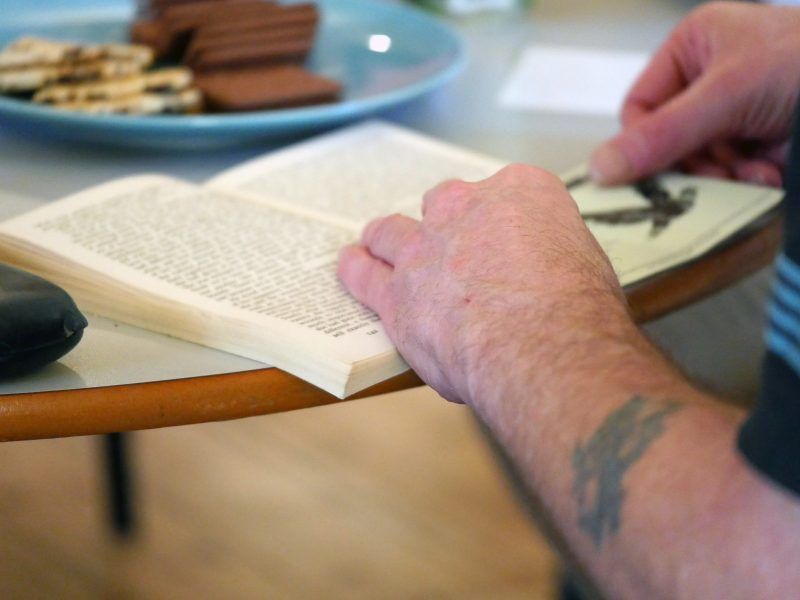As all of us continue to manage lockdown as best we can, young and old, we seek different things to maintain our wellbeing. Sometimes it’s comfort we need, other times escapism, some days we crave lively conversation and other times stillness and calm; throughout it all, we are searching for meaning.
The Reader is a Liverpool-based national charity that has pioneered a way to address these needs through the Shared Reading of great novels, poems and plays. By ‘great’ we mean literature that has the power to touch diverse people and connect us. It can help with mental health and soul troubles and make us say: ‘I never knew anyone but me felt that!’

What literature can do
But beyond the intrinsic value of books, we believe that literature’s power is multiplied when it’s shared out loud together in small groups, or pairs. Read a poem alone, as we all mostly do, and you have your own experience and imagination to bring the text to life. Read it with six other people who aren’t necessarily like you, and you have six lives and six imaginations with which to bring it to life. Read it with someone telling you what it means to them personally and you have the profoundly moving experience of intimate understanding with someone you barely know. Place this experience on a mental health ward, recovery or prison rehabilitation setting – as The Reader does across the UK – and the impact becomes all the more poignant.
This is what Shared Reading does – it creates space for us to explore ordinary human lives and relate them to our own experiences and those of others. It’s a powerful tool which, research has shown, can reduce and prevent isolation, improve psychological wellbeing and build resilience. As one group member who suffers from anxiety and depression puts it:
It has the power to change the way you see the world and, indeed, how you see yourself.
A literature lifeline to support mental health
Almost 25 NHS Trusts, prisons and councils nationally commission Shared Reading, both as a form of preventative mental health support for people in the community and to deliver targeted work with those suffering more acute mental health challenges. This includes up to 100 groups in prisons and approved premises, secure mental health units and recovery centres for those suffering from addiction. One of those groups includes that of a hospital in Berkshire, where each week, patients from four acute mental health wards come together to read anything from the poetry of Mary Oliver to the writings of Rabindranath Tagore, facilitated by their ‘Reader in Residence’. Texts would be read aloud, thoughts would be shared, connections verbal or non would be made. As one of the group members once put it, “It’s inspiring and therapeutic”.
Yet as the crisis unfolded, we had to quickly transform our services, for our group members in Berkshire and others like them across the UK – delivering Shared Reading wherever and however possible: by phone, post, radio, or online under the banner The Reader at Home.
We have heartening examples of how these adapted services are making an impact during lockdown – sessions on Zoom are providing much needed continuity and stability for those in Approved Premises. Newly curated ‘Life lines’ and ‘Reader Direct’ reading activity packs and newsletters are being distributed to mental health support services, prison units and wider partners across the UK. Specially recorded Shared Reading sessions are being broadcast over The National Prison radio network to 120 prisons nationally, to connect with residents known and new. Increasingly we are hearing of trained partner staff in clinical settings who are using Shared Reading to support their own wellbeing and that of their colleagues – as well as those who are in their care. As for the group in Berkshire, after a moment of pause, both patients and staff will be gathering again on Zoom for much needed connection with their Reader in Residence, the literature and each other.
So whilst this has been a challenging time for our community, our organisation and our sector, it has also given us impetus to innovate and to remove the geographical or logistical elements that can sometimes present a barrier. We’re optimistic that valuable learnings and fresh perspectives will emerge. As Wendell Berry writes in The Slip:
There is nothing/to do but learn and wait, return to work/on what remains. Seed will sprout in the scar. /Though death is in the healing, it will heal.
To find out more, including information about free weekly reading activity packs for organisations and those they support, visit www.thereader.org.uk/the-reader-at-home/